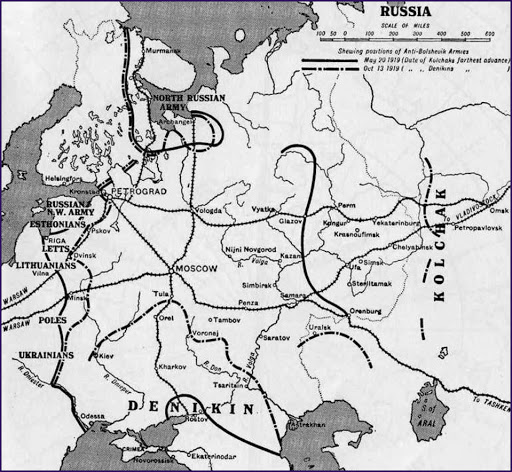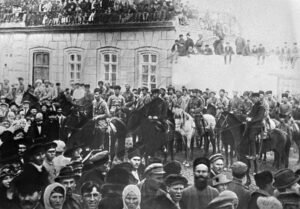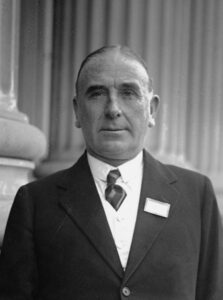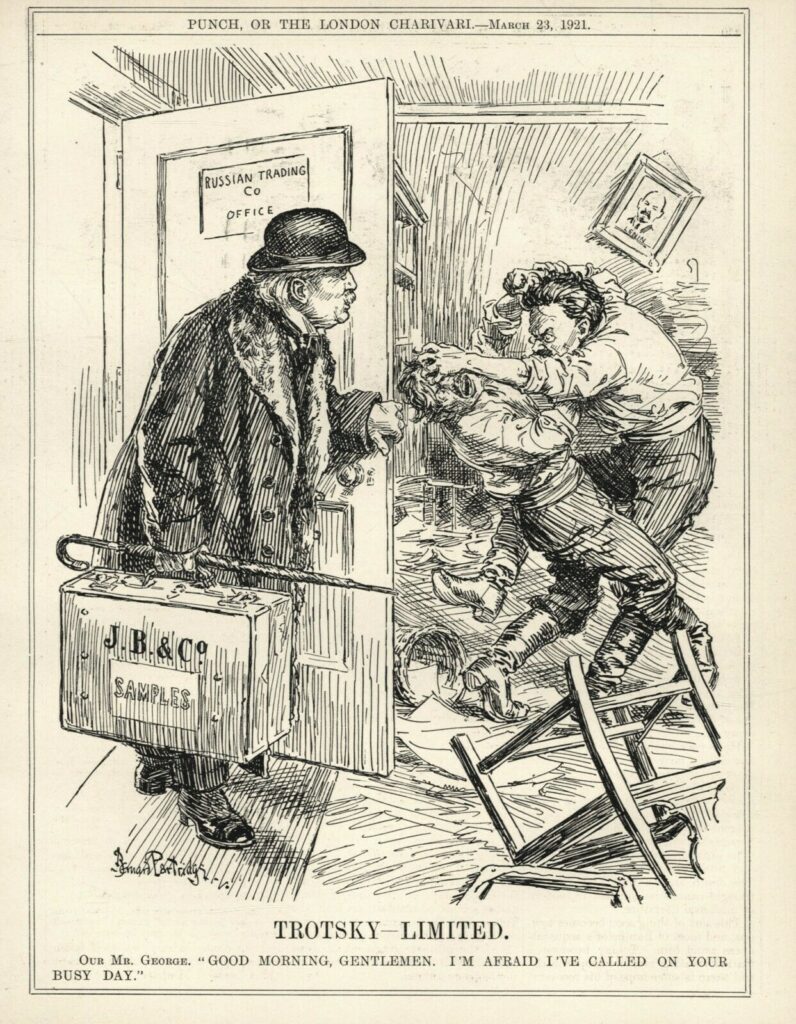Suchetana Chattopadhyay

A hundred years ago, the proxy war led by Britain against the Bolsheviks ended. Peace was concluded through the signing of the Anglo-Soviet Trade Agreement of 1921 on 16 March. This was a disguised peace treaty under the cover of establishing commercial ties. Made final after three rounds of talks between British diplomats and Soviet representatives, naming it in commercial terms was a face-saving exercise by Britain, the world’s largest empire at the time. Since the Bolshevik Revolution had promised ‘peace, bread and land’ to the people, the Soviets were not bothered by the naming of the peace treaty as long as it ended the proxy war, labeled as the Russian civil war.
Here Lies Danger
To all the empires of capital in 1918, the anti-imperialist and internationalist appeal of Bolshevism was a source of deep danger. As Eric Hobsbawm pointed out the Bolshevik Revolution of 1917 survived the ‘penal peace’ imposed by Germany a few months before Germany’s defeat in the First World War in 1918. The victorious Allies were determined to crush the ‘centre of world subversion’ immediately after the formal conclusion of the First World War. Military attack by Britain was supported by France, United States, Japan, Poland, Serbia, Greece and Romania. Combining with the remnants of the ‘White’ Russian Imperial Army and other counter-revolutionary forces, these multinational battalions unleashed invasion, terror and hunger in the regions of the former Czarist Empire. Despite the magnitude of violence suffered by the people living in the Russian territories, the attempt to uproot Bolshevik power failed. By late 1920, the Bolsheviks had won. The proprietor classes overthrown in Russia (and the political parties representing or aligned with them) readily entered into an alliance with the imperialist forces to destroy Bolshevism. Soon after the October Revolution, the Allied powers announced a policy of economic blockade against the Bolshevik Government. The Anglo-French-American alliance as well as Japan drew up plans in late 1917 and early 1918 to invade and conquer Russian territories. Japan attacked Russia from the east. Violating the terms of the Brest-Litovsk Treaty, the Austro-German alliance also attacked Russia from the West. In November 1918, with the surrender of the Austro-German power bloc and signing of the Armistice, France and Britain directly attacked Soviet Russia. The Bolsheviks drew on the support received from international units formed from German, Hungarian, French, Chinese and Korean soldiers, Lettish and Polish communists and sympathizers from across Europe in the labour movement and the colonial and semi-colonial world. By early 1920, the White Army units led by Kolchak, Denikin and the Whites were more or less defeated in European Russia. The Allied powers withdrew their troops. In spring, they backed an intervention by Poland and this move was also defeated. In 1922, white troops, with Japanese backing, were confronted and finally defeated in the eastern rim of Asia.
The determination of the British state to destroy nascent Bolshevik power was evident immediately after the revolution. The support extended to Czarist Russia and later, Kerensky’s government, was based on heavy doses of capital invested in banks, heavy industries and the railway network of the Czarist Empire in the course of the nineteenth and early twentieth centuries. Victory of Bolshevism meant there would be no recovery of the money invested, let alone any chance of maximizing profit. On top of this, Bolshevism represented the nemesis which had to be crushed if the empires of capital were to survive.

Dreams of Expansion
Britain’s military, financial and logistical support to counter-revolutionary forces was combined with dreams of expanding the British Empire into Central and Western Asia by capturing Afghanistan, Persia, and post-Ottoman Turkey. The formerly Czarist Central Asian region surrounded by these countries became the eye of the storm during the Russian Civil War in the East. By winning over the Amir of Bokhara and the Khan of Khiva, Britain hoped to finally capture Czarist Central Asia that had been conquered by the Russian Empire during the second half of the nineteenth century. Baku, the centre of Russian oil production, beckoned with its promise of opening the route to super profits. Throughout 1919, the British attempts to hold the line against a possible Bolshevik victory met with repeated blows in Central Asia. From Turkey to Persia to Afghanistan, organised resistance to overthrow British occupation and intervention was evident. British diplomatic-military personnel revealed a low morale. They freely admitted in secret official correspondence that disaster was looming over Britain’s semi-colonial expansionist aims; this could not be averted in practical terms. The only recourse left was a defensive one: to prevent the entry of Bolshevik ideas into India; the prize colonial possession in Asia that had to be retained at all costs. In 1920, the Russian civil war reached its climactic end. The Bolsheviks defeated the British Empire’s attempts to expand into Central Asia. The desperate bid to contain the spread of Bolshevism by using the British Empire’s influence in Afghanistan, Persia and China from 1918 onwards, met with a resounding failure. The buffer zones surrounding Soviet Central Asia themselves became centres of anti-imperialist protest movements and left politics emerged in each of these countries. As the British-backed counter revolutionaries faced crushing blows in region after region, the British imperial strategists made unsuccessful attempts to hold the line at the Turkestan front as British imperialism retreated. British military intelligence carefully monitored and noted each new Bolshevik advance. The reports were a chronicle of the victory of the ultimate enemy. The prism of ‘loot’ and ‘disorder’ were applied to frame the Bolshevik advance in Central Asia and their aim of expelling the local overlords and uprooting British influence over the entire region stretching from Czarist colonies to Iran and Afghanistan.
The entire horizon of Muslims and Islam came to be regarded as rebellious and connected by revolutionary upheaval and anti-colonial protests. A circular was issued on behalf of Curzon, British Foreign Secretary to put the British Empire on high alert in 1920. Telegrams sent to this effect to Cairo, Khartoum, Jerusalem, Aden, Baghdad and Simla. Sykes-Picot Agreement (1916) between France, Britain, Italy and Czarist Russia to carve up the Arab territories of the Ottoman Empire after the war which the Bolshevik Government revealed before the world press and Balfour Declaration (1917) which recognized Palestine as homeland of the Jewish people in keeping with Zionist aims generated tremendous outrage in the Arab world. The British Foreign Office feared these actions would have the consequence of mobilizing Muslim and anti-colonial opinion throughout Asia and North Africa where Anglo-French imperialist interests held sway. Central Asia was the realm of the ‘Great Game’ since the nineteenth century. During 1920, the region became synonymous with the Bolshevik challenge to imperialism. In the course of 1919, the British came to identify Tashkent as the centre of Bolshevik ‘intrigue’ against British control over Afghanistan and British Empire in India. Radio transmissions repeatedly appealed to the inter-sectional identities and locations of victims by religious, class and country-based affinities. Asian Muslims, workers and peasants, Afghans and Indian colonial subjects were exhorted to uproot British imperialism and reminded of the various forms of exploitation and atrocities they had been subjected to. The British observed with trepidation in January that the Bolshevik government in Moscow was raising special revolutionary troops from Russian Muslim populations to establish control over Central Asia, including Bokhara, Persia and Afghanistan.

Baku, under Soviet power, emerged as a centre of ideological resistance against imperialism in 1920. Following the Second Congress of the Communist International in Moscow during July-August 1920, it was here that the ‘Congress of the Peoples of the East’ was organised in September. British intelligence officials closely followed these conferences. They recognised the importance of Baku as a convergence point of communists from various Asian countries and regions. They carefully read the ‘Communist’, a Bolshevik paper published from Baku which printed an account of the unveiling of a statue erected in the memory of Karl Marx, with ‘scenes of a pantomime order enacted’. After a military parade, ‘Zinovieff indulged in the usual anti-imperialist and anti-capitalist bombast, and life-like effigies of Lloyd George, Millerand and Wilson were soaked with petrol and burnt to the accompaniment of buffoonery by a special executioner.’ Though they dismissed the Baku congress as ‘a failure’ by over-relying on their sources, the possibility of a British-backed counter revolutionary victory over Bolshevism in Central Asia was indeed slim by this time.
Imperial Reverses

As contemporary records reveal, Britain’s rulers recognized the Bolsheviks were not a creation of the Germans, the Kaiser Reich was equally interested in crushing them and the Bolshevik-led mass upheavals in Russia had not been artificially fomented. The British government also reluctantly acknowledged that the Bolsheviks had given a coherent political direction to the chaotic protests against the Czarist autocracy and a feeble provisional government. By July 1919, as counter-revolutionary forces met with reverses, the cabinet became divided over the issue. Winston Churchill, as War Secretary and a champion of direct military intervention, felt making peace with the Bolsheviks was a recipe for a disaster and ‘could not conceive that we could sink so low’. Prime Minister Lloyd George adamantly insisted on an exit strategy. His position was probably guided by intelligence reports on counter-revolutionary armies, especially the Polish contingents, as a hopeless, brutish and corrupt collection of anti-Semites and self-seekers who were alienating the local populace and driving them into the arms of the Bolsheviks. Though the British forces were withdrawn, support continued to be given to Kolchak, Denikin and the Polish forces till they collapsed. By early 1920, there were also other reasons why Britain could no longer commit troops in Russia. A revolutionary situation had emerged within the British Empire due to militant strikes and mass upsurges against colonial rule, from Ireland to Egypt to India. Intelligence reports from that year also acknowledged that the Bolsheviks, though repugnant, were ruling with a degree of popular support and that the Red Army had become a highly trained and organized force in the course of the civil war. The position of negotiating with the Bolsheviks gained ascendancy. In February 1920 Lloyd George insisted in a speech before the Commons that the civil war in Russia could not continue forever. He advocated future commercial relations to ‘bring Russia back to sanity by trade’ and declared: ‘We must use abundance to fight anarchy.’ Peace talks began in May 1920 which concluded ten months later with a commercial treaty with the Soviets.
The Peace Agreement


The commercial agreement was signed by Robert Horne, Chancellor of the Exchequer and Leonid Krasin, Commissar of Foreign Trade ostensibly to facilitate trade between the United Kingdom and the Russian Socialist Federal Soviet Republic. In reality, it represented Britain’s humiliation on many fronts. Failure in the proxy war meant the aim of expanding the borders of the British Empire was also thwarted. Before the conclusion of the Anglo-Soviet Agreement on 16 March 1921, Soviet diplomats entered into treaties of friendship with Afghanistan, Turkey and Persia, the countries facing the prospect of British invasion and occupation. The isolation of British authority in Central Asia was reflected in the negotiations. As M. V. Glenny observed, the agreement was a ‘triumph of soviet diplomacy’. Lloyd George was wise to sign it as there was no other way of containing a state representing a ‘supra-national’ ideology. The ‘no propaganda’ clause inserted by Britain in the negotiations remained a dead letter. The Communist International, formed in 1919, saw to that. By the end of 1919, all the leading British politicians except Churchill knew that the ‘white’ cause in Russia was lost. The negotiations began in May 1920 when Leonid Krasin reached London as head of Russian Trade Delegation. It was a thinly veiled political negotiation. The underlying aim was to work towards a peace treaty and end the war under veil of ‘commerce’. Three rounds of talks were held between 31 may-7 July 1920, 8 July-11 September 1920 and 12 September 1920-16 March 1921. Churchill was opposed to peace all along and during the final phase of negotiations tried his desperate worst to sabotage the talks to no avail. Meanwhile, Bolsheviks ‘completely turned the table on Britain’. At the end of February 1921, they signed a peace treaty with Persia. The Persian government immediately shook off the Anglo-Persian Treaty imposed on it in 1919 by Britain. The Bolshevik government signed a treaty of friendship with Afghanistan on 28 February 1921. In March, a Russo-Turkish pact was concluded with Kemalist Turkey. As British gambit in each of these countries failed, the British state had no other option except to sign the agreement.
Demonizing the Nemesis

The fear of imminent Bolshevik ‘invasion’ of prize colonies such as India, through the land routes of Central Asia, Afghanistan and the North-West Frontier, was henceforth to be superseded by anxieties over ideological ‘infiltration’. There was a consensus among all fractions of the British ruling class on the pressing need to safeguard the empire from its influence. Lenin and the ‘Bolshevik standpoint’ were described in apocalyptic terms in a confidential report from May 1920, when the Anglo-Russian negotiations to end the Russian civil war had formally begun:
“Lenin has no thought for humanity, no shrinking from the disasters with which his policy may afflict it in the intermediate stage. To him, leaning on the rim of the world, wars and pestilences, should they come, merely usher in a new age. Compared with the establishment of the regime of Individual Liberty and Capitalism they are not disastrous, but transitory wisps of cloud that will clear. He is not unwilling that they should come, for they are among the former things that must pass away. They are instrumental merely, to be taken up and laid down like an artificer’s tools … One shrinks from the conclusion; but Lenin’s inhuman aloofness may have set the intricacies of the European situation in a true perspective, and his calculation that he will have his way whether the people’s fight or refuse to fight, has an appearance of foresight that is both disquieting and sinister”.
Out of this nightmarish vision of an anti-thesis of capitalism driven imperialism, a Leninist thesis of colonial liberation from below was taking hold of the imagination of the downtrodden in Asia. Beyond Europe, its immediate impact could be felt in Central Asia as it turned in revolutionary anti-imperialist directions.
The author teaches History at Jadavpur University


